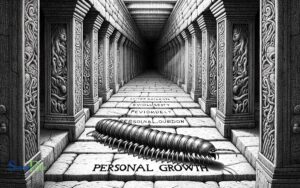What is the Spiritual Meaning of Circumcision? Purification!
The spiritual meaning of circumcision is often viewed as a symbol of purification and a dedication to God.
In many religious traditions, especially in Judaism and Christianity, it represents cutting off the sinful nature and starting a new relationship with God.
Circumcision is a religious rite that dates back to ancient times. In the Bible, it was first instituted when God made a covenant with Abraham (Genesis 17:10-14).
It was meant to be a physical sign of a spiritual commitment to God. Over time, the spiritual meaning has been interpreted by different religions and cultures in various ways.
However, the common thread is that it represents a form of purification, a cutting away of the sinful nature, and an acceptance of God’s covenant.
In the New Testament, the Apostle Paul uses circumcision as a metaphor for the spiritual transformation that occurs in a believer’s life (Romans 2:29).
He teaches that true circumcision is a matter of the heart, achieved by the Spirit, not by a written code.
This spiritual circumcision involves a process of purification, repentance, and renewal of the spirit, which signifies a deeper commitment to God and his teachings.
6 Religions: The Spiritual Meaning of Circumcision
| Religion | Spiritual Meaning of Circumcision |
|---|---|
| Judaism | In Judaism, circumcision symbolizes the covenant between God and Abraham, and his descendants. It is a physical mark of a Jewish man’s covenant with God and a symbol of his willingness to follow God’s commandments. |
| Christianity | In Christianity, particularly in the New Testament, circumcision is seen as a spiritual concept, not a physical act. It represents a Christian’s commitment to leading a life of righteousness and purity, keeping their hearts and spirits free from sin. |
| Islam | In Islam, circumcision is seen as a symbol of cleanliness, purity, and dedication to Allah. It is not explicitly described in the Quran but is emphasized in the Sunnah (the teachings and practices of the Prophet Muhammad) and is a widely accepted tradition. |
| Baha’i Faith | In the Baha’i Faith, circumcision is not considered as a spiritual obligation or symbol. Baha’is believe that religious truth is relative, not absolute, and thus rituals like circumcision are viewed as culturally relative, not spiritually necessary. |
| Hinduism | Hinduism does not have a specific spiritual significance for circumcision. It is not a common practice and is not mentioned in the central Hindu scriptures. |
| Buddhism | In Buddhism, there’s no specific spiritual significance offered to circumcision. Most Buddhists do not practice it, as Buddhism generally does not involve ritualistic physical practices. |
Key Takeaway

Five Facts About: The Spiritual Meaning of Circumcision
Circumcision In Religious Traditions
Circumcision is a cultural and religious practice that holds deep symbolic meaning in various traditions around the world.
Let’s explore the significance of circumcision in different religions, focusing on judaism, islam, and other religious and cultural practices.
Circumcision In Judaism
The covenant between god and abraham:
In judaism, circumcision serves as a sign of the covenant between god and abraham. According to the torah, god commanded abraham to circumcise himself, his descendants, and all male members of his household.
This act symbolizes the special relationship between the jewish people and god.
Symbolism of purity and obedience:
Circumcision is seen as a way to purify and consecrate the body. It represents the jewish belief in the importance of physical and spiritual purity. Additionally, circumcision is an act of obedience to god’s commandment, expressing trust and devotion to his will.
Circumcision In Islam
Following the example of prophet muhammad:
For muslims, circumcision is a cultural practice based on the example set by the prophet muhammad. Although it is not explicitly mentioned in the quran, it is widely practiced as a way to emulate the prophet’s teachings and actions.
Purification of the body and soul:
In islamic tradition, circumcision symbolizes purification of both the body and soul. It is believed to remove impurities and promote cleanliness. Circumcision is also considered a rite of passage and is often performed during early childhood.
Circumcision In Other Religions
Christianity and circumcision:
Unlike judaism and islam, circumcision is not a central practice in christianity. In fact, it is not required or encouraged in most christian denominations. Nevertheless, some christian communities may still perform circumcision for cultural or personal reasons.
Indigenous cultural practices and circumcision:
Circumcision is also found in many indigenous cultural practices around the world. These rituals often vary in their meaning and significance, serving as initiation ceremonies, rites of passage, or acts of cultural preservation.
Understanding the spiritual meaning of circumcision in different religious traditions provides insights into how these faiths connect the body, soul, and relationship with the divine.
These practices are embedded in cultural contexts, carrying deep symbolism and serving as poignant reminders of faith and identity.
Symbolic Meanings Of Circumcision
What Is The Spiritual Meaning Of Circumcision?
The practice of circumcision holds deep spiritual significance in various cultures and religions around the world. It is a ritual that marks an important transition in a person’s life, symbolizing physical and spiritual transformation.
Let’s explore the symbolic meanings of circumcision:
Physical And Spiritual Transformation
- Circumcision represents the physical transformation from childhood to adulthood, signifying the transition from boyhood to manhood.
- It also carries a spiritual transformation, as it symbolizes the individual’s journey towards higher consciousness and spiritual growth.
Rite Of Passage Into Manhood
- Circumcision is often considered a rite of passage, marking the entrance of a young boy into manhood.
- It is a significant step in assuming adult responsibilities, embracing masculinity, and participating in the broader community.
Shedding Of Old, Impure Self
- The act of circumcision is seen as a shedding of the old self, representing the removal of impurities and negative energies.
- It is an opportunity to leave behind past mistakes, regrets, and negative influences, allowing for personal growth and spiritual development.
Connection To The Divine
- Circumcision is believed to establish a stronger connection with the divine or higher power.
- It serves as a reminder of the individual’s commitment to spiritual values, virtues, and the divine purpose in their life.
Enhanced Spiritual Consciousness
- The act of circumcision is believed to enhance spiritual consciousness.
- It encourages individuals to become more aware of their thoughts, actions, and their impact on the spiritual realm.
Strengthening Of The Bond With God
- Circumcision is often seen as a covenant, strengthening the bond between the individual and god.
- It signifies a commitment to live in accordance with spiritual principles, seeking guidance and support from a higher power.
Purification And Cleansing
- Circumcision is associated with purification and cleansing, both physically and spiritually.
- It is believed to purify the body and soul, removing impurities and creating a state of spiritual cleanliness.
Removal Of Negative Energy And Sins
- Through circumcision, it is believed that negative energy and sins are removed, allowing for a fresh start and a clean slate.
- It provides an opportunity for individuals to repent, seek forgiveness, and embark on a path of spiritual healing.
A New Beginning And Spiritual Rebirth
- Circumcision represents a new beginning, a chance for spiritual rebirth.
- It signifies the start of a transformative journey towards living a spiritually aligned life.
Circumcision carries immense spiritual meaning, uniting physical transformation with profound spiritual symbolism. It is a powerful ritual that fosters personal growth, spiritual awareness, and a deepened connection with the divine.
Personal And Psychological Perspectives
The concept of circumcision holds deep spiritual significance for many cultures and religions.
While the religious and health aspects of circumcision have been extensively discussed, it is equally important to explore the personal and psychological perspectives associated with this practice.
Understanding how circumcision impacts an individual’s sense of self, body image, and belonging can provide a holistic understanding of its spiritual meaning.
So, let’s delve into the personal and psychological aspects of circumcision.
Individual Interpretations And Experiences
- Circumcision is a deeply personal experience, and its spiritual significance can vary greatly among individuals.
- Each person may interpret and experience circumcision differently, depending on their cultural background, religious beliefs, and personal values.
- Some may view it as a sacred ritual symbolizing purification, while others may see it as a rite of passage into manhood.
- Understanding these diverse interpretations can help foster empathy and respect for individuals’ unique experiences.
Psychological Effects Of Circumcision
- Circumcision can have psychological impacts on individuals, especially when it is performed during infancy.
- Some studies suggest that infants may experience pain and distress during the procedure, which can shape their early cognitive and emotional development.
- The psychological effects of circumcision can vary, ranging from feelings of loss or violation to acceptance and identification with cultural traditions.
Sense Of Identity And Belonging
- Circumcision is often connected to cultural and religious identities, shaping an individual’s sense of belonging within a community.
- For some, the act of circumcision is a way of affirming their cultural heritage and solidifying their place within their community.
- It can help individuals feel connected to their roots, traditions, and ancestors, fostering a sense of identity and belonging.
Impact On Body Image And Self-Esteem
- The removal or alteration of genital tissue through circumcision can impact an individual’s perception of their own body.
- Some individuals may experience changes in body image, which can affect their self-esteem and overall well-being.
- Understanding and addressing these concerns is crucial for promoting positive body image and self-acceptance.
Cultural And Societal Influences
- Cultural and societal influences play a significant role in shaping attitudes towards circumcision.
- Different cultures and societies have varying perspectives on the spiritual meaning and significance of circumcision.
- It is essential to acknowledge and respect these differences to foster an inclusive and open-minded dialogue about circumcision.
The Role Of Societal Norms And Expectations
- Societal norms and expectations can exert significant pressure on individuals concerning circumcision.
- In certain societies, circumcision may be a cultural expectation or a symbol of masculinity.
- This can create internal conflicts for individuals who may feel obliged to undergo circumcision due to societal pressures.
Addressing Controversies And Debates
- Circumcision is a topic of ongoing debates and controversies, with different viewpoints on its spiritual meaning and ethical considerations.
- It is essential to approach these discussions with empathy, respect, and a willingness to listen to various perspectives.
- By promoting open dialogue and understanding, we can navigate the complexities surrounding circumcision and nurture a more inclusive and compassionate society.
The spiritual meaning of circumcision encompasses personal and psychological perspectives that deeply influence an individual’s sense of self, identity, and belonging.
Understanding the diverse interpretations and experiences associated with circumcision is crucial for fostering respect, empathy, and meaningful conversations about this practice.
Contemporary Views And Practices
Evolving Attitudes Towards Circumcision
- Society’s views on circumcision have changed over time, with varied perspectives on its spiritual significance.
- More individuals are questioning the necessity of physical circumcision and exploring other options.
- The evolving attitudes toward circumcision reflect our growing awareness and understanding of spiritual practices.
Alternative Rituals And Practices
- Many cultures have alternative rituals and practices that celebrate the spiritual significance of circumcision without the physical act.
- These rituals often emphasize the symbolic aspects of the ceremony rather than focusing on the physical procedure.
- Alternative rituals provide individuals with a way to honor their spiritual beliefs while making choices that align with their personal values.
Naming Ceremonies And Alternative Rituals
- Naming ceremonies have emerged as popular alternatives to traditional circumcision rituals.
- These ceremonies celebrate the symbolic transition from infancy to childhood and are often seen as a way to bestow blessings upon the child.
- Naming ceremonies emphasize the importance of community, love, and unity in a child’s life, highlighting the spiritual aspects of their growth without the need for circumcision.
Non-Surgical Options And Symbolic Gestures
- Non-surgical options and symbolic gestures have gained traction among those seeking alternatives to physical circumcision.
- Families may choose to incorporate other practices, such as meaningful tattoos or symbolic jewelry, to mark the spiritual significance of the child’s journey.
- These non-surgical options allow individuals to embrace the spiritual essence associated with circumcision without the physical intervention.
Embracing The Spiritual Essence Without Physical Circumcision
- Ultimately, the spiritual meaning of circumcision lies in the intention and symbolism behind the practice.
- Individuals are finding ways to honor their spiritual beliefs through alternative rituals, naming ceremonies, and non-surgical options.
- While physical circumcision has traditionally been viewed as the primary method to express spiritual significance, contemporary practices offer new avenues for individuals to connect with their spirituality in a way that aligns with their personal values.
FAQ About The Spiritual Meaning Of Circumcision
What Is The Spiritual Significance Of Circumcision?
Circumcision is a symbolic ritual that represents purity, covenant with god, and the removal of sinful tendencies.
Does Circumcision Have Any Religious Significance?
Yes, circumcision holds religious significance in many faiths, including judaism and islam, symbolizing spiritual purification and dedication to god.
Are There Any Health Benefits Associated With Circumcision?
Yes, circumcision has been linked to several health benefits, such as a reduced risk of urinary tract infections, sexually transmitted infections, and certain cancers.
Is Circumcision A Painful Procedure?
Circumcision is typically performed with anesthesia to minimize pain. With proper care, any discomfort experienced during the procedure is temporary.
Conclusion
The spiritual meaning of circumcision holds deep significance for many religious and cultural communities.
From its origins as a sign of the covenant between god and abraham in judaism, to its symbolism of purity and initiation into the community in islam, circumcision represents a powerful spiritual transformation.
This sacred act is believed to cleanse the body and soul, symbolizing a commitment to god and a connection to one’s heritage.
It is a physical reminder of one’s faith and a way to establish a sense of belonging and identity within a religious community.
Whether performed for religious or cultural reasons, circumcision is a deeply personal and spiritual ritual that holds different meanings for different people.
Understanding its significance can foster a greater appreciation for the traditions and beliefs of various cultures, and promote a more inclusive and compassionate mindset towards those who practice circumcision.
By delving into the spiritual meaning behind this practice, we are able to gain insight into the rich tapestry of human spirituality and the diverse ways in which individuals connect with the divine.
Bonus: The spiritual meaning of circumcision
What Did Circumcision Symbolize?
Circumcision is the removal of the foreskin from the penis. It is most commonly performed for religious or cultural reasons, but can also be done for medical reasons. The procedure is usually performed on newborn boys before they leave the hospital.
The word circumcision comes from the Latin words “cum” meaning “with” and “cis” meaning “cut”. Circumcision has been practiced by many cultures and religions for thousands of years.
In Judaism, it is considered to be a covenant between God and Abraham, and it is a requirement for all Jewish males.
Muslims also practice circumcision as a requirement of their faith. There are many different theories about why circumcision began, but no one knows for sure. Some believe that it was done as a way to prevent masturbation or reduce sexual pleasure.
Others believe that it was seen as a way to make men more hygienic or to mark them as belonging to a particular tribe or group. Today, there is no medical reason to circumcise baby boys in developed countries like Australia, Canada and the United States.
In fact, there are some risks associated with the procedure which include bleeding, infection and pain. However, many parents still choose to have their sons circumcised for religious or cultural reasons.
What Is The Biblical Meaning Of Circumcised?
In the Old Testament, God commands Abraham to circumcise himself and his male descendants as a sign of the covenant between them.
The Hebrew word for circumcision is “mila,” which literally means “cutting.” It refers to the removal of the foreskin from the male genitalia.
Although circumcision is not explicitly required in the New Testament, many Christians believe it is still a symbolic act that represents their commitment to following Christ.
Covenant Of Circumcision Meaning
Most people are familiar with the term “circumcision,” but fewer know what the covenant of circumcision actually is.
Put simply, the covenant of circumcision was an agreement between God and Abraham that if Abraham and his descendants agreed to be circumcised, then God would bless them.
Theologians debate exactly when this covenant was made – some say it was made before Abraham had any children, while others believe it was after Isaac was born.
Circumcision itself is a fairly simple procedure, and in most cases today is done soon after a baby boy is born.
The meaning of the covenant of circumcision goes beyond just the physical act of removal of the foreskin from the penis. It also signifies spiritual cleansing and commitment on behalf of those who agree to be circumcised.
In Jewish tradition, the covenant of circumcision is seen as a way to make oneself right with God and as a sign of obedience to His commands. For many Christians, circumcision is not required but it is still seen as an important symbol of faith.
Whether or not you choose to be circumcised, it’s important to understand the significance of this ancient covenant and what it means for those who follow Abraham’s example today.
Define Circumcision Of The Heart
When we think of circumcision, we typically think of the physical act of cutting away the foreskin from the male penis.
But did you know that there is also such a thing as spiritual circumcision? Spiritual circumcision, or circumcision of the heart, is an act of God whereby He removes our sinful nature and replaces it with His Holy Spirit.
It’s a radical transformation that takes place deep within us, and it results in a life lived for Him instead of for ourselves.
The term “circumcision” comes from the Latin word “circumcidere,” which means “to cut around.” When applied to the physical body, it refers to the removal of excess tissue.
In other words, it’s about getting rid of anything that isn’t necessary. And when applied to the spiritual realm, it’s about getting rid of anything that isn’t from God.
Circumcision of the heart is first mentioned in Deuteronomy 10:16, where God tells His people to circumcise their hearts so they will love Him with all their hearts and souls.
This is reiterated in Leviticus 26:41, where God says He will circumcise our hearts and make them obedient to Him if we turn away from our wicked ways.
In both cases, we see that spiritual circumcision is directly linked to obedience; it’s something that God does in order to help us obey Him better. So how does this work?
How does God go about circumcising our hearts? The answer is found in Romans 2:29-30: “For no one is a Jew who is merely one outwardly but a Jew who is one inwardly, and real circumcision is not outward but inward.”
Here Paul makes it clear that true circumcision doesn’t happen through any physical activity; rather, it’s a work of God on the inside that changes us completely.
We may look unchanged on the outside, but on the inside, we’re entirely different people new creations in Christ (2 Corinthians 5:17).
This change doesn’t happen overnight; rather, it’s a lifelong process as we grow more and more into Christlikeness (Ephesians 4:15). But make no mistake – once God starts this good work in us (Philippians 1:6), He will finish it (1 John 3:9).
What Is The Significance Of Circumcision In Judaism?
In Judaism, circumcision is considered to be a very important commandment. It is a symbol of the covenant between God and His people, and it is also seen as a way of marking out the Jewish people as different from other nations.
Circumcision has been practiced by the Jewish people for thousands of years, and it continues to be an important part of Jewish life today.
Uncircumcised Spiritual
Uncircumcised spiritual people are those whose hearts have not been hardened by the world. They are able to feel and express emotions more deeply than those who have been through life’s tough experiences. As a result, they tend to be more compassionate and loving.
People who haven’t had their hearts hardened by the world are often more in touch with their spirituality. They can be emotionally open and expressive, which allows them to connect with others on a deeper level. These connections often create strong bonds of compassion and love.
Uncircumcised Meaning In The Bible
When it comes to circumcision, there are a lot of different opinions out there. Some people believe that it is a necessary part of being Jewish, while others believe that it is an outdated and barbaric practice. So what does the Bible actually say about circumcision?
The word “circumcise” actually means to cut off the foreskin of the male genitalia. In the Old Testament, God commanded Abraham to circumcise all of his male descendants as a sign of their covenant with Him (Genesis 17:10-14). This covenant was later extended to all Jewish males (Leviticus 12:3).
So why did God command His people to perform this procedure? There are a few different theories out there. Some believe that it was simply a way for God to distinguish His people from other nations who did not practice circumcision.
Others believe that it was a way to symbolically cleanse oneself before entering into the covenant with God.
Whatever the reason may be, it is clear that circumcision was considered a very important part of being Jewish in Biblical times. Today, however, many Jews do not practice circumcision and some even see it as cruel and unnecessary.
Biblical Circumcision Vs Modern Circumcision
Biblical Circumcision is the removal of the foreskin of the male penis. The term “circumcision” comes from the Latin word “circumcidere” which means to cut around. It is one of the oldest and most common surgical procedures, dating back thousands of years.
In ancient times, it was often performed as a religious ritual or as a mark of social status. Today, circumcision is most commonly performed for medical reasons, such as reducing the risk of UTI’s (urinary tract infections).
Modern circumcision usually involves the use of a surgical instrument called a Gomco clamp or Mogen clamp to remove the foreskin.
The procedure takes only a few minutes and is usually done in infancy or early childhood. There are some risks associated with circumcision, such as bleeding and infection, but these are typically very minor and can be easily treated.
Is Hair Loss Also Considered a Form of Spiritual Purification Similar to Circumcision?
Some people believe that the spiritual meaning of hair loss goes beyond physical appearance. They view it as a form of spiritual purification, similar to circumcision in some religious traditions. The shedding of hair can represent letting go of ego and materialism, allowing for a deeper connection to one’s spiritual self.
Dreaming Of Being Circumcised
For many men, the idea of being circumcised is a nightmare. The thought of having their penis mutilated is enough to make them break out in a cold sweat. And yet, there are some men who dream of being circumcised.
These men often have a deep-seated desire to be rid of their foreskins. They may feel that they are unclean or that their foreskin is a source of shame. In some cases, men who dream of being circumcised may have a fetish or kink for circumcision.
They may find the idea of being cut incredibly erotic and exciting. Whatever the reason, dreaming of being circumcised can be a powerful and intense experience.
If you find yourself dreaming about this procedure, it might be worth exploring what it could mean for you on a deeper level.
Meaning Of Circumcision In Hebrew
In the Hebrew culture, circumcision is a sign of the covenant between God and His people. It is also a symbol of purity and cleanliness. The word “circumcision” comes from the Latin word “circumcidere,” which means “to cut around.”
In other words, it is the removal of the foreskin from the penis.The practice of circumcision dates back to biblical times. In Genesis 17, God told Abraham to circumcise himself and all his male descendants as a sign of their covenant with Him.
This tradition continued throughout history, with many cultures adopting it as part of their own religious beliefs. For example, Muslims also practice circumcision as a way to show their submission to Allah.There are many reasons why parents choose to have their sons circumcised.
For some, it is simply a matter of following tradition or religion. Others see it as a way to promote hygiene or prevent future health problems such as UTIs or penile cancer. Whatever the reason may be, circumcision is an important part of many cultures and religions around the world.






